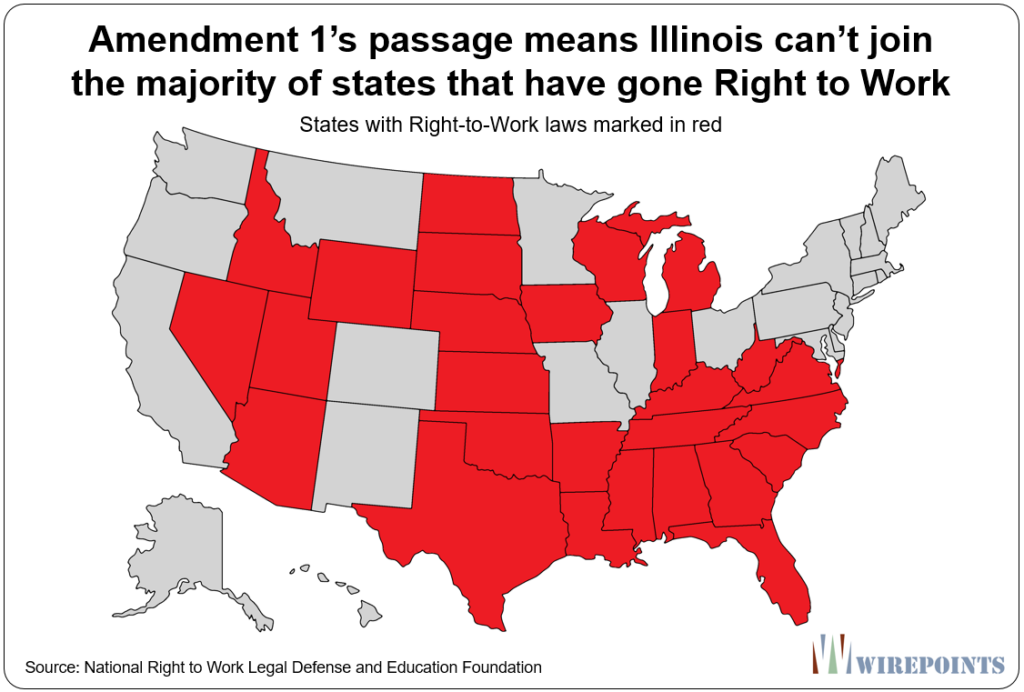Editor's note: This opinion article was originally published at Wirepoints.org
Talk about shooting yourself in the foot. Illinois lawmakers’ triumph with the “Workers’ Rights” amendment may very well condemn Gov. J.B. Pritzker and the General Assembly’s commitment to make Illinois “one of the leading EV hubs in the entire nation.” The constitutional amendment, which grants massive collective bargaining rights to Illinois labor, also blocks in perpetuity Right To Work (RTW) in the private sector. That doesn’t bode well for manufacturing in Illinois and EV industries in particular.
A review of the data below shows that the EV revolution is largely happening in Right-To-Work states – and that Illinois is already losing big. Crain’s recently reported that Illinois is zero for 18 in its attempts to attract EV battery factories. That’s not to say that a lack of RTW is the only factor hurting Illinois’ chances – businesses have long complained “about [Illinois’] tax rates, workers’ compensation system, precarious state finances and the drawn-out process of getting permits for new factories,” after all, but the correlation sure looks clear.

EV and battery makers have skipped Illinois so far
| Wirepoints
Let’s start with a graphic that shows the location of “industries of the future” including battery factories, EV plants, semiconductor plants, and more that have responded to Pres. Biden’s federal “green investments.” Illinois comes up empty.
Instead, massive battery and auto investments are concentrated in states that are almost entirely RTW, from Michigan down to Texas and then on over throughout the Southeast, as well as in several of the western states.
You can’t help but see the overlap with the RTW graphic below.

For another cut on where EV investment is taking place, take a look at the list of the 15 largest announced EV manufacturing facilities as of June 2022, according to The Atlas Public Policy Group. Illinois, despite Gov. Pritzker and lawmakers’ green devotion, again comes up empty.
Georgia is getting a Hyundai investment of nearly $5.6 billion and 8,100 jobs. Kentucky has won a $5.8 billion, 5,000-worker battery factory from Ford. And the same car maker will also build a $5.6 billion, 6,000 employee EV car plant in Tennessee.
A couple of those investments represent a blow to Illinois. Georgia is the recipient of a $5 billion, 7,500-employee investment from Illinois-based Rivian. And Stellantis, which has indefinitely idled a 1,350-employee Jeep Cherokee factory in Illinois, is investing in a $2.5 billion battery plant in neighboring Indiana.
Overall, Illinois has missed out on a lot of investment and jobs, as a recent WSJ article notes: “Through November, about $33 billion in new auto-factory investment has been pledged in the U.S., including money for the construction of new assembly plants and battery-making facilities, according to the Center for Automotive Research, a nonprofit organization based in Michigan.” That’s on top of $37 billion invested nationwide that Illinois failed to attract last year.
Illinois’ green failure
The WSJ article says that “The U.S. auto industry is entering one of its biggest factory-building booms in years, a surge of spending largely driven by the shift to electric vehicles and new federal subsidies aimed at boosting U.S. battery manufacturing.”
With Right-To-Work dead in Illinois, it’s hard to see how Illinois can play catch up. It’s a consequence of big-government, big-labor politics. Pritzker and other political leaders can push for Illinois to be either the nation’s extreme pro-union state or a leader in EV manufacturing…but not both.
But expect the governor to offer billions more in taxpayer subsidies – on top of the billions he’s already promised – in a futile effort to try.
